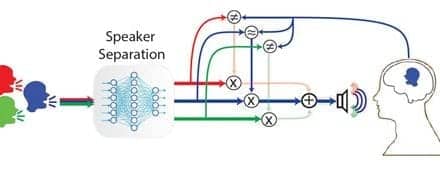A growing number of studies point to the myriad negative physical, social, emotional, and economic effects of hearing loss. However, most of this research focuses on the hearing-impaired individual, and not their communication partners (CPs)—their family members, spouses, or significant others.
In a paper published in the February 2015 edition of the Journal of the American Academy of Audiology (JAAA), Rebecca Kamil and Frank Lin, MD, PhD, provide a systematic review of the literature about how hearing loss in older adults affects their CPs. Although not surprising to hearing care professionals, what emerges is evidence of restricted social life, burden in communication, and poorer quality of life and relationship satisfaction.

Dr Frank Lin shares his research on age-related hearing loss and cognition during his 2014 ADA “Game Changer” session, “Hearing Loss and Aging: Consequences, Implications, and Creating Better Outcomes Through Alternate Models of Care.”
Kamil and Lin conducted a series of database searches for articles using keywords that might provide insight into the effects of hearing loss on the CPs of older adults who have hearing impairment. They also included hand-selected studies, as well as studies obtained from the references of the identified articles. Of the 1047 articles initially identified, and after culling for duplicates and outlying subject matter, they found 24 papers to include in their systematic review on this topic. All of these papers appeared in peer-reviewed journals, dealt with subjects 50+ years old, and contained specific data related to the hard-of-hearing (HOH) person and the CP that was deemed crucial by the reviewers (eg, hearing assessments, outcome metrics, etc).
A total of 16 of the studies in the systematic review found that hearing loss in an individual led to reduced Quality of Life (QOL) for the CP. Seven of the studies cited communication difficulties as a source of stress and lower satisfaction levels with the relationship, and 4 studies indicated that the CPs experienced decreased social interactions due to the challenges related to the person with hearing loss.
The systematic review revealed areas that may warrant further investigation. Two studies looked at the emotional impact of the individual’s hearing loss on the CP: one showed poorer CP emotional health while the other concluded there was no effect. Similarly, one study concluded that hearing impairment negatively impacted the CPs’ physical health and that more research in this area is needed.
Several studies included in Kamil & Lin’s review looked at how treatment of hearing loss via hearing aids, cochlear implants, and/or aural rehabilitation impacted the CP. The authors noted “Overall, these interventions were associated with improvements in QOL, relationship satisfaction, communication, and social functioning for the CP.” Some areas of improvement included the ability to enjoy life, conversations, TV, group activities, and feelings toward the HOH person.
The studies also point out that hearing loss in an individual can initiate a cascading effect that may be borne more heavily by the spouse of the hearing-impaired individual (eg, becoming their spouse’s “ears” or taking on increased stressful responsibilities). Feelings of social isolation, embarrassment, and frustration can naturally carry over to the dyadic partner.
Kamil & Lin were careful to emphasize that there was a lack of homogeneity across the 24 studies’ designs, quality, methods, and outcome measures, and this precluded any opportunity for a quantitative meta-analysis. Among the most important findings is that “Studies broadly support the conclusion that hearing impairment in a person who is HOH detrimentally affects the QOL of the CP across a wide variety of metrics…and improvements are generally observed after treatment of hearing loss in the person who is HOH.”
In conclusion, they state that “…further research, clinical decision making, and health policy should account for possible cascading effects of hearing impairment on dyadic partners and CPs.”
Editor’s Note: For more research from Dr Lin, type his name into the search window at the top of the page, or see his September 2012 Hearing Review article and the summary of his recent keynote at the 2014 Academy of Doctors of Audiology convention.




